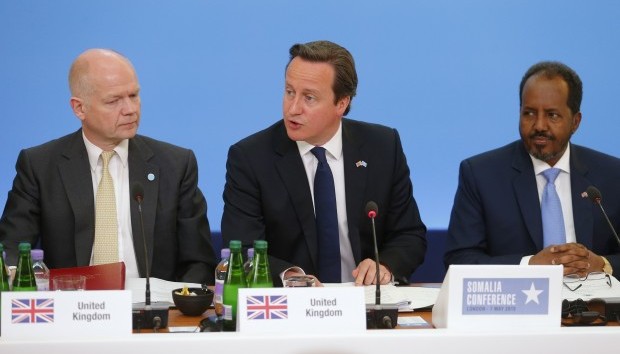
Britain’s prime minister, David Cameron, center, sits with British foreign secretary William Hague, left, and Somali president Hassan Sheikh Mohamud as he speaks at the Somalia conference in London on Tuesday May 7, 2013. (AP Photo/Andrew Winning, Pool)
London, Asharq Al-Awsat—Countries including Britain, China, the US, South Africa and EU states have agreed to contribute USD 130 million to support the Somali government’s efforts to rebuild the country and establish security.
The pledges were made at the Somalia Conference held in London on May 7. UK prime minister David Cameron and Somali president Hassan Sheikh Mohamud co-hosted 54 partner countries and organisations, including the UN, the African Union and the IMF in the UK capital.
The governments of the UK and Somalia aimed to rally international support behind the rebuilding of the country after more than two decades of conflict in the country. David Cameron praised the progress made by Somalia’s government and acknowledged that the “international community has taken major steps” in supporting Somalia’s recovery.
Britain alone pledged USD 54 million towards projects to help address Somalia’s challenges of security and governance and an additional USD 224 million in aid towards famine relief. David Cameron made clear that Somalia’s security was “vital for Britain” and its national security.
The priority issues discussed included international support for Somalia’s security forces, justice sector, and public financial management systems.
Somalia is widely regarded as a failed state. The country has been plagued by an Islamist insurgency since 2007, led by the militant group Al-Shaba’ab. A two-year-long famine between 2010 and 2012 killed thousands of Somalis and led to an exodus of refugees to neighboring countries. Piracy off Somalia’s coast is a major security concern for many Western nations, who make use of the shipping lanes through the Gulf of Aden.
David Cameron voiced optimism for Somalia’s future. “Today, I think we are seeing the beginnings of a new future for Somalia,” Cameron told delegates assembled at the conference.
President Hassan Sheikh Mohamud shares in his optimism. “The time to help Somalia is now,” he told reporters at a press conference, adding that he believed the conference had “captured” the moment.
There are promising signs that Somalia is recovering from years of civil war. Somalia’s government armed forces and the African Union Mission in Somalia (AMISOM), with the help of their Ethiopian allies, have reclaimed areas from Al-Shaba’ab control. Somalis chose a new parliament and government last year, the first one in more than 20 years widely viewed as legitimate, which has promised to improve state infrastructure and security. The Somali government has set out the Six Pillar Policy to help develop the country.
Somali President Hassan Sheikh Mohamud stated that “our ultimate goal is to see a united Somalia.” He was confident that Somalia was starting to see signs of recovery and that it aimed to move towards an “end to the era of dependency.”
This optimism was somewhat marred by a suicide attack that ripped through Mogadishu on Sunday, killing at least 11 people. Al-Shabab claimed responsibility for the attack, the Islamist militia still controls large swathes of land outside the capital Mogadishu.
Concerns also abound over internal government corruption and the transparency of aid delivery. The Somali president assured donors that “we will prove in the eyes of the world that we will deliver.”
UK Foreign Secretary William Hague encouraged a cautious optimism, saying that “this process is fragile, and maintaining the momentum will require leadership in Somalia and support from the region and the international community.”
The delegates at the conference also discussed the return of refugees to Somalia and dialogue between the Federal Government of Somalia and Somaliland. However, the president of Somaliland refused to attend the conference as it failed to recognize what he sees as Somaliland’s independence from Somalia.
Sexual violence against women, a particularly taboo subject in Somalia, was also broached and the conference attendees agreed to support initiatives on preventing sexual violence.
The Somalia Conference is one of a sequence of events this year that aim at supporting Somalia, including the G8 meetings, the Tokyo International Conference on African Development, and an EU-hosted conference on the New Deal for fragile states.
